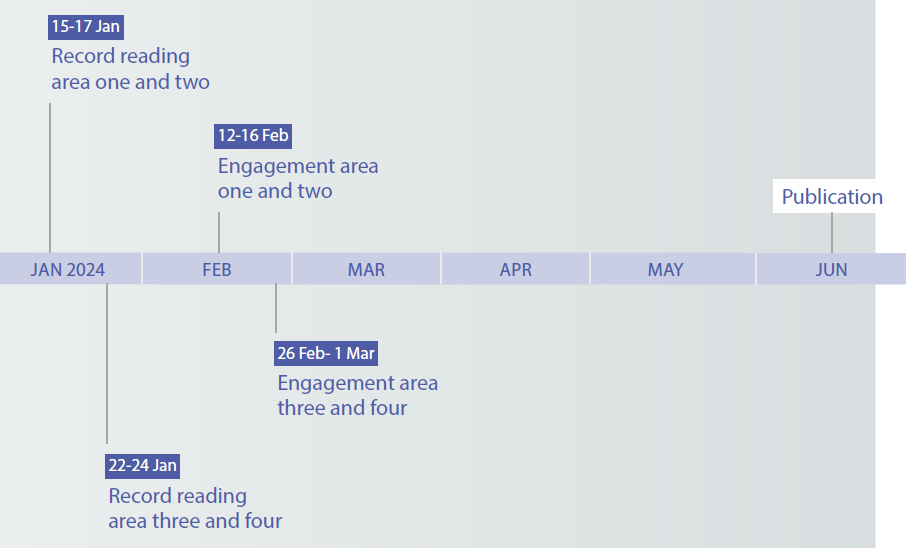Update - January 2024
What we have done since our last briefing in September 2023
We have been working alongside the four areas that came forward to be part of more detailed work.
- Aberdeen city
- Dundee city
- Dumfries and Galloway
- Na h-Eileanan Siar (Western Isles)
We now have staff survey responses from these four areas. We have reviewed these alongside all the evidence we gathered earlier this year from the national survey and our review of existing literature.
This has helped us develop our understanding of social work’s contribution to upholding the rights of disabled children and young people in Scotland.
We have used our findings so far to help us plan our next steps and inform the key questions we will ask children, families and staff.
Our stakeholder community has continued to be involved, helping to shape our approach to engagement activities.
Planning for our next steps is well underway in the four areas and we are grateful for all the time and effort they have already given to this review.
Next steps
We are now entering the busiest stage of our review and will be working with our four areas on the following.
In January we will be reviewing 30 children’s social work’s records in each of the areas. This will help us build our understanding of the effectiveness of assessments, plans and reviews in ensuring children benefit from the right help and the right time. These records have been sampled randomly.
In January we will ask each of the four areas to share a video and information leaflet with children and their parents or carers to inform them of our review and invite them to become involved.
Between 22 January and 29 February we will open an electronic questionnaire for children and young people to complete online. This will be one of a range of ways we will gather views directly from children and young people. The arrangements for completing the questionnaire will be shared by each of the four local authorities.
In February we will be on-site in each of the four areas. We want to gather the views of children and their parents or carers and the staff who work with them. We will meet with children wherever they are most comfortable. For some children this might be with friends or family. For others it might be alongside workers who are important to them. We hope the important people in children’s lives will help us to do this. We will work alongside staff in each of the four areas to ensure we are inclusive and respect children’s rights in our approach.
If you have any questions for the review team, they can be contacted via email on This email address is being protected from spambots. You need JavaScript enabled to view it..
We’d like to thank everyone who has been involved in this review.
Read more
Podcasts
Boxset 1 - Meaningful Connection
The Anne’s Law project advisers speak with real-life people about real-life stories that will resonate with all of us. People like Jenny, manager at Glennie House; Ken, a care home resident; Natasha, from Care Homes Relatives Scotland; professionals from across the sector and many more. Packed with insightful, thought-provoking ideas and tips to stay connected with your loved ones, these podcasts have something for everyone.
Boxset 2 - Finding The Why
David Marshall, Senior Improvement Adviser (Pharmacy) and Katy Jenks, HC One Dementia Care Manager, Scotland discuss improving dementia care and reducing inappropriate use of psychoactive medicines in care homes.
Choosing a quality childminder
Care Inspectorate chief executive Jackie Irvine talks with Audrey Donnan, chief inspector for early learning and childcare, about choosing a quality childminder.
Listen anywhere, anytime to the episodes that interest you. Listen on Spotify, Amazon Music, wherever you get your podcasts. Alternatively, you can listen on Podbean.
Read more
Update - September 2023
What we have done so far
Following the notification of the thematic review, we issued a survey to social work teams across Scotland. By mid- august we had received responses from all 32 local authority areas. We are now looking at the information from the survey. This is helping us to build a picture about social work’s contribution to how well disabled children and young people’s needs are assessed, planned for, and met.
We have been reading national reports and research to find out what disabled children and young people have already said what is important to them, and about their experiences of support.
Conversations with our key stakeholders, are helping us to develop our ideas about our engagement approaches with children and young people. We are keen that we explore opportunities to ensure that our approach is rights based, accessible and is inclusive.
We will use all the information we have gathered so far to help us identify our focus during the next stage.
Next steps
Four areas have volunteered to help us better understand children and young people’s experiences and the difference social work services are making to their lives. We are pleased to welcome them to this next stage of the review. The areas are:
- Aberdeen city
- Dundee city
- Dumfries and Galloway
- Na h-Eileanan Siar (Western Isles)
We will be working with these social work teams from September 2023 to March 2024.
More information can be found on our website here.
If you have any questions for the review team, they can be contacted via email on:
This email address is being protected from spambots. You need JavaScript enabled to view it.
We’d like to thank everyone who has been involved in this review.
Read more
Disabled children and young people: Thematic review 2023-24

On this page you will find information about our national report Disabled children and young people’s experiences of social work services: a thematic review.
Formats
- Braille is available on request
If you require any other formats please email This email address is being protected from spambots. You need JavaScript enabled to view it.
Review
Our aim in carrying out this review was to learn and understand more about disabled children and young people’s views and experiences of the support they received from social work services. We focused on social work’s contribution to getting it right for every disabled child and considered how well disabled children’s rights were being respected and upheld.
This report presents the key messages of our review of how well social work services contribute to ensuring disabled children have their rights respected and receive early care and support. It includes reflections and actions for social work services and Scottish Government to consider in order to improve outcomes for disabled children and young people.
Key messages
Our review found that:
- Respectful relationships were key to building a culture of listening to and respecting children and young people’s views. This ensured they were engaged in decisions about their care and support.
- Too many disabled children and young people’s views, feelings and wishes were not being heard.
- When children and young people received the right support at the right time from social work services, this helped them to grow and develop
- Increasing complexity of need and high demand for services was outweighing the availability of supports.
- Children and young people were not always provided with meaningful choices about the support they received.
- Parents and carers routinely provide a significant level of care and support. Their wellbeing must be promoted and protected.
- The quality of social work assessments, plans and reviews were variable and were not always properly addressing all the child or young person’s needs.
- The experience of transitioning into life as a young adult continues to be characterised by unpredictability and uncertainty for too many disabled young people.
- Compassionate and dedicated social work staff were helping to improve the lives of children and young people. High workloads and recruitment and retention of staff significantly challenged staff teams.
- The social work role was not always easily understood by families and/or other professionals.
- Reliable data and a shared definition of disability are not available to inform future planning or to support the setting budgets.
Actions required
The responsibility for improvement sits with us all. The actions noted below will require a shared approach across Scottish Government, local authorities, national and local organisations and public bodies, including the Care inspectorate.
The actions required:
- The views of disabled children and their families must be considered as part of service mapping, understanding unmet need and service planning.
- A robust approach to gathering and analysing data on disabled children and young people must be implemented, both in social work services and wider. This must be used effectively to inform service planning and improvement.
- We must take action in response to the views of disabled children and their families to ensure gaps in service provision are addressed.
- The role of social work services in providing care and support to disabled children must be clearly defined and understood across agencies. Clear and accessible information should be available and communicated to children and their families. This should include eligibility criteria.
- Opportunities for effective early intervention should be strengthened.
- Opportunities for play and friendships, along with other areas that are important to children, should be maximised. This will need a collective and holistic response.
- Adequate resourcing must be made available to enable services to develop and improve.
You can read the full report here.
Read more


